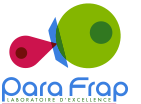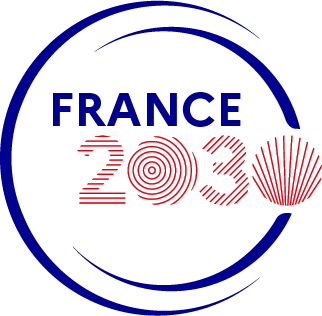

Coordinators: Alain Dessein, Mohamed-Ali Hakimi
Participants: Pied, Dessein/Marquet, Hakimi, Delauw, Guillen, Blandin, Marion
High throughput sequencing (HTS) technologies now allow low cost and rapid sequencing of genomes, transcriptomes, or regulatory sequences (small, antisense, non-coding or microRNAs) in different organisms (hosts, vectors and parasites). Using these new technologies in combination with genetic approaches, ParaFrap will explore parasite, vector and human genomes, searching for genetic variants, regulatory sequences or RNAs that affect parasite virulence, host or vector susceptibility to infection and disease, or the efficacy of treatment.
Description of work:
A platform of high throughput DNA/RNA sequencing will be setup and open to all ParaFrap groups, providing technical and bioinformatic expertise to retrieve, clean and analyze data. This platform will involve the high throughput sequencing facility of Lille (A. Tordeux, GenoScreen, Lille) and S.Tomavo, (Lille Institut Pasteur).
a) Genetic analysis of host factors (Hakimi, Dessein/Marquet, Pied)
Host microRNAs fine tune the expression of a large portion of the genome, and play important roles in innate immune responses. Parasites interfere with the host RNA silencing pathway to reshape their cellular environment and eventually cause pathology. Using RNA HTS, we will investigate how the host proteome can be reprogrammed dynamically and reversibly through the microRNA function following cell infection with Toxoplasma and Leishmania, and screen for parasite effectors that interfere with the host cell RNA machinery. A large part of host genetic factors predisposing to parasitic diseases such as leishmaniasis, severe malaria or trypanosomiasis correspond to rare variants with high-risk effects. Genome HTS will be used to identify rare variants with high risks predisposing to disease caused by Leishmania braziliensis (cutaneous leishmaniasis) in Brazil, L. donovani (Kala Azar) in Sudan, P. falciparum (severe malaria) in children in Mali. Analysis will be conducted in sample populations previously recruited by ParaFrap members.
b) Genetic analysis of vector factors (Blandin)
Mosquitoes mount a potent immune response that limit parasite numbers and is determined, in a large part, by genetic factors. We will screen for genetic factors governing mosquito resistance to malaria parasites, using high throughput technologies for fine mapping of quantitative trait loci and a reciprocal allele-specific RNAi assay. In addition, we will develop novel genetic tools allowing robust functional characterization of any chosen gene in the mosquito genome.
c) Genetic analysis of parasite factors (Bringaud, Delauw, Mazier)
Parasites, including Plasmodia and trypanosomatidae, display panoply of pathways that are seldom found together in a single organism. Metabolomic studies associated with reverse genetics approaches (KO, RNAi and/or overexpression of genes) will allow building a comprehensive metabolic network, to understand nodes of regulation and homeostasis along the cell cycle or upon induction of differentiation of the parasite or in response to its environments (nutrients, drugs, etc). In this project, we will focus on lipid biosynthesis in P. falciparum and carbohydrate/amino acids metabolism and its connection to lipid metabolism in trypanosomes. The expertise, metabolomic tools and approaches developed by H. Vial & F. Bringaud will be made available to other ParaFrap partners. The relations between a host and its parasite are often highly species-specific. The molecular basis for this specificity is not known for many interactions. The team of Mazier will exploit genome sequence data to investigate the differences in host-specificity between P. falciparum and closely related chimpanzee parasites, focusing on parasite factors that are specific/essential to the interactions with host cells. A gene replacement approach will then be used to analyze the contribution of candidate factors in P. falciparum host specificity. Delauw et al., will exploit forward genetic mapping and a robust reverse genetic screen to identify parasite genetic factors(s) that direct the resistance loci (called Toxo-1) in rats. The ultimate goal is to define allelic variants of these parasite factors and to understand how the combinations of these influence the outcome of toxoplasmosis in its host.
Deliverables:
D1. Identification of genetic variants predisposing to severe malaria, cutaneous leishmaniasis, Kala Azar or American trypanosomiasis (Dessein, Marquet, Pied)
D2. Analysis of microRNome alterations during infection by Toxoplasma and Leishmania (Hakimi, Dessein)
D3. Identification of genetic factors governing mosquito resistance to malaria parasites (Blandin)
D4. Building of metabolic networks in P. falciparum and T. brucei (Vial, Bringaud) D5. Identification of parasite genetic factors governing host-specificity in P. falciparum and resistance toToxoplasma infection (Mazier, Delauw)
Gordon Research Conference 2026 – Biology of Host–Parasite Interactions The 2026 Gordon Research Conference (GRC) on Biology of Host–Parasite Interactions will take place June 7–12, 2026, at Salve Regina University, in...
The INSERM workshop “Modern methods in molecular parasitology” will take place in Montpellier, France, from 4–6 November 2026. This event will bring together leading experts in...
The 15th CAPF (French Anti-Parasitic and Anti-Fungal Consortium) workshop will take place on 16–17 March 2026 in Strasbourg (France). This event is an excellent opportunity for students and postdoctoral researchers to participate and contribute...
Call for Applications: New Junior Research Groups at Institut Pasteur The Institut Pasteur has launched an international call to recruit new junior group leaders.This is a unique opportunity for high-potential scientists to...
JOB : Ingénieur·e d’étude / Research Engineer – Mosquito Immunity (IBMC, Strasbourg) 🇫🇷 Le laboratoire Mosquito Immune Responses recrute un·e ingénieur·e d’étude à l’IBMC (Strasbourg). La personne recrutée sera en...
Applications are now open for the 2026 Biology of Parasitism (BoP) course, taking place June 12–July 23, 2026 at the Marine Biological Laboratory in Woods Hole, MA.This intensive 6-week program offers PhD students and postdocs advanced training in...
Newcastle University offers a full-time, fixed-term position (3 years) for a Research Assistant or Research Associate in Molecular Parasitology — funded by the Medical Research Council (MRC). About the Opportunity Location:...
Multidisciplinary PhD opportunity in the fields of infectious diseases, gene regulations and molecular signalisation. Fully Funded 4-Year PhD at the University of York A fully funded PhD opportunity is available at the...
The EMBO Workshop 2025 “Host–Parasite Relationship: From Mechanisms to Control Strategies”, took place from October 5–8, 2025, on the beautiful Île des Embiez (France). Organized within the framework of the LabEx ParaFrap and...
Postdoc (M/F) in molecular and biochemical parasitology (Toxoplasma gondii) A 24-month post-doctoral position starting on January 2026 and funded by the French National Research Agency (ANR) is available in the in the...

© 2023. All rights reserved MLCOM
Notre site LabEx ParaFrap utilise des cookies pour réaliser des statistiques de visites, partager des contenus sur les réseaux sociaux et améliorer votre expérience. En refusant les cookies, certains services seront amenés à ne pas fonctionner correctement. Nous conservons votre choix pendant 30 jours. Vous pouvez changer d'avis en cliquant sur le bouton 'Cookies' en bas à gauche de chaque page de notre site. En savoir plus
Ce site utilise des cookies pour assurer son bon fonctionnement et ne peuvent pas être désactivés de nos systèmes. Nous ne les utilisons pas à des fins publicitaires. Si ces cookies sont bloqués, certaines parties du site ne pourront pas fonctionner.
Ce site utilise des cookies de mesure et d’analyse d’audience, tels que Google Analytics et Google Ads, afin d’évaluer et d’améliorer notre site internet.
Ce site utilise des composants tiers, tels que NotAllowedScript69a4f89742a43ReCAPTCHA, Google NotAllowedScript69a4f89742706Maps, MailChimp ou Calameo, qui peuvent déposer des cookies sur votre machine. Si vous décider de bloquer un composant, le contenu ne s’affichera pas
Des plug-ins de réseaux sociaux et de vidéos, qui exploitent des cookies, sont présents sur ce site web. Ils permettent d’améliorer la convivialité et la promotion du site grâce à différentes interactions sociales.
Ce site web utilise un certain nombre de cookies pour gérer, par exemple, les sessions utilisateurs.

